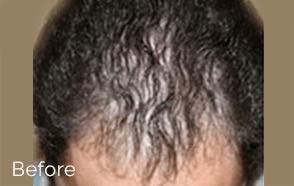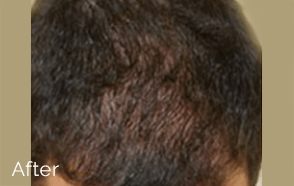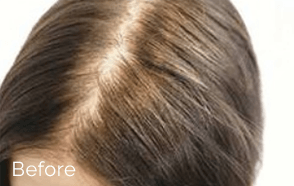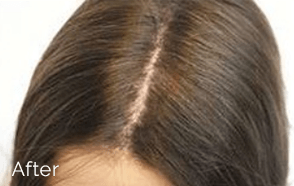PRP Hair Loss
Treatments Vancouver
PRP Hair Loss Treatments Vancouver
When you have a thinning head of hair or are balding, you can feel self-conscious and insecure about your appearance. It’s hard to maintain a positive outlook on life when the way people see you is so different from how you perceive yourself.
For some people who experience male pattern baldness, it can lead to anxiety and depression. Luckily there are treatments for this condition that help reverse the effects of hair loss.
One such solution is PRP hair loss treatments which use plasma rich in growth factors to stimulate hair follicles and encourage new hair growth while reducing inflammation around the scalp.
In recent studies, men with early-stage male pattern baldness saw an average increase of nearly 18% in their density within only six months!
Women saw similar results, with an average increase in density of 16%. PRP is a much better alternative than the older hair transplant procedures that used plugs of skin with hairs.
How does PRP treatment work?
Hair loss is the result of genetic factors and hormones. When a hair follicle goes into hibernation, it causes the hair to thin and eventually fall out.
The PRP (Platelet Rich Plasma) therapy for hair uses your blood plasma which contains growth factors that activate dormant hair follicles, fortifying the hair root and stimulating new healthy growth.
The PRP hair loss treatment makes it easier for the follicles to access oxygen and nutrients, along with preventing future hair loss even after treatments are discontinued.
Injecting plasma rich in growth factors has been shown to boost collagen production beneath the scalp skin as well as thicken existing hair.
The rush of vitamins, growth factors, and antioxidants when properly injected at the target sites, activates dormant hair follicles and makes existing hair fuller, and thicker.
A PRP hair treatment is a quick non-surgical alternative to surgery and can help you get back to feeling confident and enjoying life.
Benefits Of PRP Hair Restoration Treatments
Some benefits of PRP include:






Treatments are done in your dermatologist’s office, with a series of PRP sessions as needed. You can resume your normal activities immediately and no one will even know you have been treated!
What does PRP target?
Our PRP injections are designed to block the formation of dihydrotestosterone, which causes hair loss. We use growth factors that activate tired and dying roots. The treatment also provides deep cleansing for an overall healthy scalp appearance.
Our professional staff understands the emotional toll that excessive hair loss can have on a person’s life. We also know how frustrating it is to deal with the side effects of prescription drugs without positive results.
Our Hair Loss Treatments




PRP Hair Loss Treatments at a Glance

A series of 3-5 treatments for best results.

1 year

Local Injection

Results
A series of 3-5 treatments for best results.

of Results
1 year

Local Injection

Very Low

Very Low

45 minutes

Immediately

Time
45 minutes

Work
Immediately
Who is a good candidate for hair PRP?
Many people are good candidates for PRP hair loss treatments. Generally, those suffering from the effects of aging, chemotherapy, or alopecia are excellent candidates. As well, women who are experiencing alopecia or thinning hair.
People have been treated with PRP therapy for hair loss, skin rejuvenation, and pain management so it’s clear that PRP works effectively on multiple conditions.
Types of Hair Loss Hair PRP Can Treat




PRP Hair Loss Procedure
The PRP treatment involves taking a sample of your blood, plasma and platelets are separated then injected back into the scalp. The PRP injection contains hyaluronic acid which helps to hydrate the skin and stimulate collagen production.
After PRP treatment for hair loss, a topical anesthetic is placed on the scalp to make you more comfortable during the PRP injection process. Topical anesthetics are applied and PRP injections take place in four sections of the scalp.
PRP Vs Hair Transplants
The PRP hair loss treatment is much better than transplants with plugs of skin-bearing hairs because there is no surgery involved. Treatment improves hair quality while increasing the number of healthy hair follicles and strengthening current roots.
By using PRP, the hair follicles will be stimulated to grow back thicker and stronger.
Hair transplants, on the other hand, are invasive procedures where plugs of skin with hairs are grafted onto bald areas on the scalp. A PRP treatment uses your plasma to stimulate dormant roots and make existing hair healthier.
This PRP treatment is a great non-surgical alternative to hair implantation and is proven effective.
Concerned about thinning hair or balding?
If you’re ready to shed the worries of thinning hair for good, PRP therapy is a quick and easy way to boost your self-esteem.
So what are you waiting for? Schedule your PRP consultation with Everyoung Med Vancouver today!
FAQs About PRP for Hair Loss
The rush of vitamins, growth factors, and antioxidants when properly injection at the target sites, activates dormant hair follicles and makes existing hair fuller, and thicker.
Our doctor may also recommend a prescription medication to decrease sensitivity to hormonally-induced hair loss/thinning.
You will receive a thorough hair examination by our trained consultants. Rest assured that you will be treated with the latest treatment that the scientific and medical professions can offer.
With locations in Burnaby & Port Coquitlam, we proudly serve people throughout Greater Vancouver and the lower mainland with all of their hair, skin and beauty needs. Contact us now to book an appointment.
The duration of hair loss treatment varies, and it depends on the specific product or method used, as well as individual response; consistent and prolonged use is often necessary for sustained results.
The need for lifelong hair loss treatment depends on the underlying cause, as some conditions may require ongoing management, while others may allow for discontinuation after achieving desired results.
The most effective treatment for hair loss depends on the underlying cause, with options ranging from medications like minoxidil and finasteride to surgical interventions such as hair transplant, tailored to individual circumstances.
Hair loss treatments may vary in effectiveness for individuals, as success depends on factors like the cause of hair loss, the chosen treatment method, and individual response to the treatment.
Discontinuing hair loss treatment can lead to a gradual reversal of its benefits, as the underlying causes are no longer being actively addressed, and the natural course of hair loss may resume.
The effectiveness of hair loss treatment varies among individuals, with factors such as the cause of hair loss, the chosen treatment method, and individual response influencing the outcome; success rates can vary, and not all treatments work for everyone.
Hair loss treatments, including FDA-approved medications like minoxidil and finasteride, are generally safe when used as directed, but individual responses vary; consult with a healthcare professional for personalized advice.
Hair loss is challenging to cure because it often has multiple potential causes, including genetic factors, hormonal changes, and environmental influences, making it a complex condition that may require tailored and ongoing treatment approaches.
The main cause of hair loss is often attributed to a combination of genetic factors, hormonal changes, and aging, leading to conditions such as male or female pattern baldness (androgenetic alopecia). However, various factors, including medical conditions, medications, and lifestyle, can contribute to hair loss as well.
The first-line treatments for hair loss often include FDA-approved medications such as minoxidil (topical) and finasteride (oral), which are commonly recommended by healthcare professionals to promote hair growth and manage certain types of hair loss, such as androgenetic alopecia.
The worth of hair treatments varies for individuals based on factors like the cause of hair loss, treatment effectiveness, and personal preferences, making it essential to consult with a healthcare professional for personalized advice.
The necessity of hair treatment depends on individual circumstances, including the cause and extent of hair loss, personal preferences, and desired outcomes, making it a decision that should be discussed with a healthcare professional.
Gentle hair treatments like hydrating masks, protein treatments, and natural oils, such as argan or coconut oil, are less likely to cause damage. Choose products based on your hair type and condition for optimal results.
Leaving hair treatment in your hair for an extended period beyond the recommended time may lead to product buildup, potential scalp irritation, or, in some cases, counterproductive results, so it’s important to follow the instructions provided.
The time it takes for a hair treatment to show results varies based on the specific treatment, the underlying cause of the hair issue, and individual factors, with noticeable improvements potentially ranging from weeks to months of consistent use.
Leaving hair treatment on for too long can lead to product buildup, potential scalp irritation, or adverse effects, so it’s crucial to follow the recommended duration provided in the product instructions.
Hair regrowth during treatment depends on the underlying cause and effectiveness of the treatment, with some individuals experiencing noticeable improvement in hair growth while using certain interventions.
Hair regrowth after treatment is possible, depending on the cause of hair loss, the effectiveness of the treatment, and individual factors; however, results vary, and not all treatments lead to significant regrowth for everyone.
Scalp treatments, especially those addressing specific underlying causes of hair loss, may help prevent further hair loss and promote a healthier scalp environment, but their effectiveness can vary, and it’s advisable to consult with a healthcare professional for personalized advice.
The time it takes for hair loss to improve varies widely depending on the cause, the chosen treatment, and individual factors; improvement may be noticeable within a few weeks to several months of consistent and appropriate treatment.
Wash your hair as needed to maintain scalp health and prevent conditions contributing to hair loss, balancing cleanliness without excessive washing.
The cost of hair loss treatment varies widely depending on the specific method or product chosen, making it essential to consider individual budgets and treatment plans.
The worth of hair loss prevention measures depends on individual priorities, the underlying causes of hair loss, and the effectiveness of chosen interventions, making it a subjective decision.
To reduce hair fall and promote hair growth, maintain a balanced diet, manage stress, use mild hair care products, and consider consulting a healthcare professional for personalized advice and treatment options.
To overcome weak hair, practice gentle hair care, avoid excessive heat styling, use nourishing hair treatments, maintain a balanced diet rich in vitamins and minerals, and consider consulting with a hairstylist or healthcare professional for personalized recommendations.
Hair loss doesn’t always get worse; its progression depends on various factors, including the underlying cause, treatment interventions, and individual responses, with some individuals experiencing stabilization or improvement with appropriate care.
Supplements that may help with hair loss include biotin, vitamin D, iron, zinc, and omega-3 fatty acids; however, it’s essential to consult with a healthcare professional before taking supplements to determine appropriate dosages and rule out any underlying deficiencies or health concerns.
You should be concerned about hair loss if it is sudden, severe, or accompanied by other symptoms, prompting a consultation with a healthcare professional to determine potential underlying causes and appropriate interventions.
Hair loss can be both a medical and cosmetic concern, as it may result from various underlying health conditions, and addressing it often involves a combination of medical treatments and cosmetic measures.
Proper hair treatment is important for maintaining hair health, preventing damage, and addressing specific concerns, contributing to overall well-being and appearance.
Follow the recommended usage guidelines for your hair treatment, as some may be suitable for daily use, while others may advise less frequent application to prevent buildup and potential side effects.
Hair treatments may have side effects depending on the specific product or method used; potential side effects can include scalp irritation, dryness, or allergic reactions, underscoring the importance of following product instructions and consulting with a healthcare professional if concerns arise.
Hair treatments can benefit your scalp and hair by promoting hydration, nourishing the hair follicles, reducing breakage, improving overall hair health, and addressing specific concerns like dandruff or excessive dryness, depending on the type of treatment used.
The effectiveness of hair treatments versus hair masks depends on individual needs and specific product formulations, as they serve different purposes, such as addressing specific concerns or providing deep conditioning and hydration.
Washing your hair after treatment can help remove any residual product and prevent buildup, ensuring the treated hair and scalp remain clean and healthy.
The experience after a hair growth treatment varies among individuals, but some may feel a sense of satisfaction or hope as they anticipate potential improvements in their hair health and growth.
The duration of hair loss treatment varies based on the underlying cause, with some conditions requiring ongoing management and others allowing discontinuation after achieving desired results, to be determined in consultation with a healthcare professional.
Hair treatments can expire, and it’s important to check the product’s expiration date to ensure effectiveness and avoid potential adverse reactions.
The duration to keep hair treatment in your hair varies by product, so it’s essential to follow the specific instructions provided for optimal results.
The time it takes for healthy hair to grow back varies, typically ranging from a few weeks to months, depending on factors like individual growth rate, overall health, and proper care.
The natural growth rate of hair varies, but on average, hair grows about half an inch (1.25 cm) per month, and it may take several months to years to achieve noticeable length, depending on factors such as individual genetics, health, and care practices.
You can observe new hair growth on your scalp by noticing shorter and finer hair strands emerging, experiencing a change in texture, or observing small, unpigmented hairs often known as “vellus hairs” developing in areas where hair growth is occurring.
The most effective hair growth treatments include FDA-approved medications like minoxidil and finasteride, as well as surgical interventions like hair transplants, with the choice depending on individual factors and consultation with a healthcare professional.
Hair loss may grow back naturally in certain cases, particularly if it is temporary and related to factors such as stress, illness, or medication changes; however, for more persistent or genetic causes, interventions like medications or treatments may be necessary for regrowth.
The two main FDA-approved medications for treating hair loss are minoxidil, available as a topical solution or foam, and finasteride, an oral prescription medication. These treatments are commonly used to address conditions like androgenetic alopecia (male and female pattern baldness).
The main cause of hair loss is often attributed to a combination of genetic factors, hormonal changes, and aging, leading to conditions such as androgenetic alopecia (male or female pattern baldness). However, various factors, including medical conditions, medications, and lifestyle, can contribute to hair loss as well.
Yes, treatments like minoxidil and finasteride have demonstrated effectiveness in addressing hair loss, but individual responses vary, emphasizing the importance of professional consultation for personalized recommendations.
As of my last knowledge update in January 2022, the latest research on hair loss includes investigations into potential new treatments, such as stem cell therapy, platelet-rich plasma (PRP), and advancements in understanding the genetic and molecular basis of hair loss; for the most recent developments, it’s recommended to check the latest scientific literature or consult with healthcare professionals.
Stress-induced hair loss is primarily linked to hormonal changes, leading to an increased production of cortisol, which can disrupt the hair growth cycle and contribute to hair shedding.
Yes, hair growth is possible after hair loss, and it depends on factors such as the underlying cause, chosen treatments, and individual responses to interventions.
Book an
Appointment

ALL SERVICES
- Acne treatment
- BBL- IPL Photofacial
- Body Fx
- Botox
- Coolsculpting
- Dermal Fillers
- Morpheus8
- Sylfirm X
- Sofwave
- Fotona StarWalker®
- Fractora
- Hair Loss / Balding
- Hydrafacial MD
- Laser Hair removal
- Alma Harmony® XL Pro
- Alma Harmony® XL Pro ClearLift™
- Alma Harmony® XL Pro Dye VL Laser
- Lip augmentation
- Laser Genesis
- Microdermabration
- Microneedling
- Non-surgical Facelift
- Pigmentation Treatment
- PDRN Salmon DNA
- Picosure
- Prp Blood Facial
- Red and vessels treatment
- RF Collagen Induction
- Ultherapy
- Thermage
- Thermage® CPT™
- Thermage® FLX
- Vaginal Rejuvenation
Where to Find Us?
Downtown Vancouver

MondayClosed
Tuesday10:00am–6pm
Wednesday10:00am–6pm
Thursday10:00pm–6pm
Friday10:00am–6pm
Saturday10:00am–6pm
SundayClosed
 604-706-1503 (English)
604-706-1503 (English) 604-305-2098 (Chinese)
604-305-2098 (Chinese)Metrotown, Burnaby

Monday10:00am–6pm
Tuesday10:00am–6pm
Wednesday10:00am–6pm
Thursday10:00pm–8pm
Friday10:00am–6pm
Saturday10:00am–6pm
Sunday10:00am–6pm
 604-305-2098 (English)
604-305-2098 (English) 604-305-2098 (Chinese)
604-305-2098 (Chinese)Free Parking Available
GET DIRECTIONSPort Coquitlam

Monday10:00am-6pm
Tuesday10:00am-6pm
Wednesday10:00am-6pm
Thursday10:00am-6pm
Friday10:00am-6pm
Saturday10:00am-6pm
SundayClosed
 604-210-6319 (English)
604-210-6319 (English) 604-305-2098 (Chinese)
604-305-2098 (Chinese)Free Parking Available
GET DIRECTIONSNorth Vancouver

MondayClosed
Tuesday10:00am–6pm
Wednesday10:00am–6pm
Thursday10:00pm–6pm
Friday10:00am–6pm
Saturday10:00am–6pm
SundayClosed
 604-265-7044 (English)
604-265-7044 (English) 604-305-2098 (Chinese)
604-305-2098 (Chinese)Free Parking Available
GET DIRECTIONSWith locations in Downtown Vancouver, North Vancouver, Burnaby & Port Coquitlam, we proudly serve people throughout greater Vancouver and the lower mainland with all of their acne, skin and beauty needs.
Contact us now to book an appointment.




